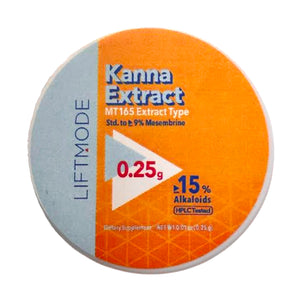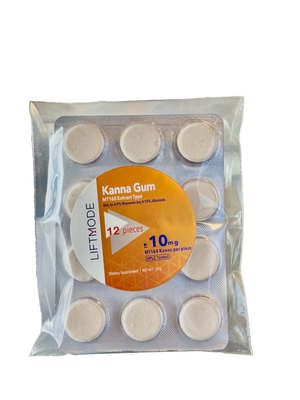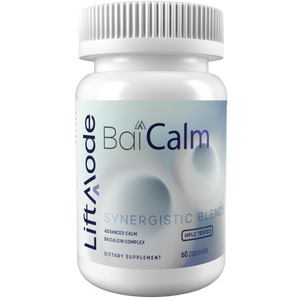In this article, we explore the best supplement combinations to create the ultimate Mood-Lifting stack. We often get questions about which supplements go well together, which is why we’re addressing it in this blog post! Read on, as we examine TWELVE of our favourite
Mood-Lifting stacks, why they work well together, and how best to take them.
Our Mood-Lifting supplements are well-known for their effectiveness, having all undergone multiple trials and studies to assess their safety and efficacy. Nevertheless, there’s always room for improvement, and a supplement stack is one great way to boost the mood-lifting, stress-reducing, or sleep-promoting benefits of these top natural supplements.
![]()
1. 5-HTP - Griffonia simplicifolia extract
![]() 5-HTP is the biochemical precursor
5-HTP is the biochemical precursor for serotonin, a brain hormone and neurotransmitter involved in regulating mood and many biological processes including sleep, appetite, memory, learning capacity, sex drive, circulatory system, immune system, endocrine system, and muscle tone.
[1] Serotonin is also the key hormone involved in supporting a happy mood.
[2] 5-HTP supplements are often extracted from the leaves and flowers of the
Griffonia simplicifolia plant, an African shrub that contains high concentrations of the neurotransmitter precursor. Studies have shown that 5-HTP supplements are effective at improving mood and subjective feelings of well-being, while simultaneously reducing stress.
[3] Some people also use 5-HTP to reduce their intake of food because it can increase feelings of satiety (fullness) when taken with a meal.
[4] The recommended serving size for 5-HTP is 50 – 100mg, taken 1-3 times per day. Side effects can include gastrointestinal effects like nausea and stomach cramps when used taken in large servings. It is not recommended to take this supplement if you are on any medication, and especially not with antidepressants or SSRIs due to the risk of dangerous interactions.
[5]
Goes Well With:
-
![]() DL-Phenylalanine: Another of our top mood-lifting supplements, this combination of D- and L-Phenylalanine is effective at increasing levels of dopamine in the brain.[6] It makes a great stack when taken alongside 5-HTP because the two help to balance serotonin and dopamine levels in the brain.
DL-Phenylalanine: Another of our top mood-lifting supplements, this combination of D- and L-Phenylalanine is effective at increasing levels of dopamine in the brain.[6] It makes a great stack when taken alongside 5-HTP because the two help to balance serotonin and dopamine levels in the brain.
-
Green Tea Extract: An extract of the ‘world’s healthiest drink’. Rich in plant polyphenols and catechins, including the well-known EGCG. Studies have shown that EGCG inhibits an enzyme in the stomach called dopamine decarboxylase, which allows greater concentrations of 5-HTP to reach the brain.[7] [8]
-
Oleamide: A functional fatty acid involved in the natural process of sleep-promotion. Oleamide is known for its benefits in promoting relaxation, reducing stress, and improving mood.[9] These benefits certainly complement 5-HTP, and the two supplements make a great stack for improving sleep!
2. DL-Phenylalanine
![]()
DL-Phenylalanine is a 50/50 combination of both the naturally-occurring L-Phenylalanine and the synthetic D-Phenylalanine, both mirror images of the same compound. L-Phenylalanine is an amino acid found in protein-rich foods and is one of the building blocks of proteins.
[10] D-Phenylalanine also occurs naturally but is more often synthesized as this is easier than natural extraction techniques. It was originally thought to have the potential to be developed as an analgesic (pain-relief substance).
[11] When taken as a dietary supplement, DL-Phenylalanine is known for its effectiveness in helping to support a healthy mood, to reduce feelings of stress
[12], and to boost natural energy levels through its effects on catecholamines (including dopamine and epinephrine).
[13] Some studies have also pointed to possible benefits for cognitive performance
[14] and to help reduce physical feelings of pain.
[15] The recommended serving size for DL-Phenylalanine is 100 - 500mg daily, which can be separated into several smaller servings if required. Side effects may include heartburn, nausea, and headaches as well as increased blood pressure.
[16] Importantly, people with the rare medical condition called phenylketonuria (PKU) should never take Phenylalanine supplements (or aspartame sweetener).
Goes Well With:
-
![]() GABA: The body’s primary ‘depressant’ hormone which helps to reduce signals from the Central Nervous System to promote calm and relaxation. Research suggests that D-Phenylalanine while improving dopamine levels, may inhibit the natural release of GABA.[17] Using a GABA supplement is a good way to counteract this effect!
GABA: The body’s primary ‘depressant’ hormone which helps to reduce signals from the Central Nervous System to promote calm and relaxation. Research suggests that D-Phenylalanine while improving dopamine levels, may inhibit the natural release of GABA.[17] Using a GABA supplement is a good way to counteract this effect!
-
L-Theanine: Found in high concentrations in tea, this amino acid-like compound is a great addition to DL-Phenylalanine for its ability to assist with stress-reduction.[18] As with DL-Phenylalanine, studies have shown that L-Theanine may have the potential to help with cognitive performance.[19]
-
Hordenine: A powerful natural compound found in the Bitter Orange fruit, Hordenine is often taken as an energizing and mood-lifting supplement. Its effects include temporarily inhibiting the breakdown of dopamine.[20] Since DL-Phenylalanine boosts dopamine levels, the two are thought to make a good match!
3. L-Tryptophan
![]() L-Tryptophan is an essential amino acid
L-Tryptophan is an essential amino acid found in protein-rich foods. The human body cannot produce it, which is why it is called “essential”. In terms of its role in the body, Tryptophan is involved in protein synthesis, as well as the production of niacin (vitamin D3) and serotonin.
[21] When taken as a dietary supplement, a portion of L-Tryptophan is converted into 5-HTP, which is then converted into serotonin.
[22] Some people prefer using this supplement over 5-HTP because it reportedly has less potential to cause gastrointestinal side-effects. It can be used to help boost your mood, to reduce stress, and to promote healthy sleep at night.
[23] Some studies show that Tryptophan supplements may be effective in supporting cognitive function
[24], and to suppress appetite – particularly for carbohydrate-rich foods.
[25] The recommended serving size for this supplement is 500 – 1000 mg, taken 1-2 times per day. It is not recommended to exceed the suggested serving size as this may cause gastrointestinal side effects like nausea and cramps.
[26] Do not use this supplement if you are taking any antidepressant or SSRI medication, as there may be a risk of dangerous interactions.
Goes Well With:
-
![]() Melatonin: As the body’s natural sleep-promoting hormone, Melatonin is a great supplement to help reduce the time taken to fall asleep.[27] We recommend combining these two for a synergistic natural sleep stack.
Melatonin: As the body’s natural sleep-promoting hormone, Melatonin is a great supplement to help reduce the time taken to fall asleep.[27] We recommend combining these two for a synergistic natural sleep stack.
-
Synephrine: A well-known dietary supplement and one of the key active compounds in the Bitter Orange. Synephrine is known to confer a powerful boost in physical energy[28], which goes well with L-Tryptophan’s cognitive support. Together, the two may also be used to support a healthy metabolism and reduce appetite.[29]
-
Choline bitartrate: Another fantastic natural dietary supplement to help support cognitive function.[30] Choline occurs in high concentrations in protein-rich foods like meat, eggs, and fish, and Choline supplements are often recommended for vegans and vegetarians.
4. Rhodiola Rosea
![]() Rhodiola Rosea is a herbal extract
Rhodiola Rosea is a herbal extract with a long history of use in traditional medicine in the Northern hemisphere, especially in the cold climates of northern Asia and Scandinavia. It is best known for its effects on fatigue and stress – a powerful ‘adaptogen’ that helps to naturally fight fatigue, boost energy levels and improve mood.
[31] Several clinical studies have been conducted to elucidate this herbal extract’s effects on mood. In one such study, its effects on 89 participants were assessed in a randomized, placebo-controlled, double-blind study, using parallel groups over 6 weeks. The results showed that a serving size of between 340 – 680 mg/day was effective at improving mood and sleep.
[32] The recommended serving size is between 300 – 680 mg daily, and contains high levels of salidroside and rosavins – the active phytochemicals in Rhodiola extract. Side effects are generally unreported when used at the recommended serving size. However, WebMD suggests side effects of large servings may include agitation, insomnia, anxiety, and occasional headaches.
[33]
Goes Well With:
-
![]() Caffeine + L-Theanine: The combination of Caffeine with L-Theanine has been found to be more effective than using either alone, for supporting cognitive performance.[34] Together, they also provide the user with a noticeable boost in energy, which complements Rhodiola’s effects greatly.
Caffeine + L-Theanine: The combination of Caffeine with L-Theanine has been found to be more effective than using either alone, for supporting cognitive performance.[34] Together, they also provide the user with a noticeable boost in energy, which complements Rhodiola’s effects greatly.
-
5-HTP: Mentioned above, 5-HTP is one of our favourite mood-lifting supplements. Combining 5-HTP with Rhodiola is a great way to boost its adaptogen effects, to help reduce feelings of stress and to improve mood.
-
Magnolia Bark Extract: Rich in alkaloids like Honokiol and Magnolol, the effects of this ancient plant extract are well-established in their ability to promote relaxation and feelings of calm, while also reducing stress[35] – a perfect complement to Rhodiola!
Conclusion
In summary, these four top mood-lifting supplements, including 5-HTP, L-Tryptophan, DL-Phenylalanine, and Rhodiola Rosea extract, are both highly effective when taken alone and also when taken in combination with complementary supplements in a stack. The term ‘stacking’ refers to taking multiple supplements in combination, which can be a great way to boost their benefits and help improve the effects you are seeking.
WARNING AND DISCLAIMER: It’s important to treat supplement stacks with care. Some supplements, when taken together, can potentiate (increase) the effects of others. Always use the lowest serving size recommended when taking supplement stacks to assess how your body feels. Everyone is different and what works for one person may be too strong for another.
![]()
Medical Disclaimer
Not intended to treat, diagnose, or cure any disease or ailment. Please read and fully understand potential adverse effects before using this product. These statements have not been reviewed by the FDA and are not written by a medical professional. Please consult your doctor before using any supplements, especially if you have any medical conditions.
Tristan
B.Sc. in Molecular Biology and Biochemistry Researched & written by
Tristan and verified by the Liftmode.com Research Team
References:
[1] Mohammad-Zadeh LF, Moses L, Gwaltney-Brant SM.
Serotonin: a review.
J Vet Pharmacol Ther. 2008 Jun;31(3):187-99.
[2] Young SN, Leyton M.
The role of serotonin in human mood and social interaction.
Insight from altered tryptophan levels. Pharmacol Biochem Behav. 2002 Apr;71(4):857-65.
[3] Hinz M, Stein A, Uncini T.
5-HTP efficacy and contraindications.
Neuropsychiatric Disease and Treatment. 2012;8:323-328.
[4] Rondanelli M, Opizzi A, Faliva M, Bucci M, Perna S.
Relationship between the absorption of 5-hydroxytryptophan from an integrated diet, by means of Griffonia simplicifolia extract, and the effect on satiety in overweight females after oral spray administration.
Eat Weight Disord. 2012 Mar;17(1):e22-8.
[5] 5-HTP.
WebMD.com, available online from
https://www.webmd.com/vitamins/ai/ingredientmono-794/5-htp [Accessed Jul 13, 2018]
[6] DL-Phenylalanine. Compound Summary for CID 994.
PubChem Open Chemistry Database, available online from
https://pubchem.ncbi.nlm.nih.gov/compound/dl-phenylalanine [Accessed Jul 13, 2018]
[7] Bertoldi M, Gonsalvi M, Voltattorni CB.
Green tea polyphenols: novel irreversible inhibitors of dopa decarboxylase. Biochem Biophys Res Commun. 2001 Jun 1;284(1):90-3.
[8] Orlefors H, Sundin A, Lu L, Oberg K, Långström B, Eriksson B, Bergström M.
Carbidopa pretreatment improves image interpretation and visualisation of carcinoid tumours with 11C-5-hydroxytryptophan positron emission tomography.
Eur J Nucl Med Mol Imaging. 2006 Jan;33(1):60-5. Epub 2005 Sep 24.
[9] Boger DL, Henriksen SJ, Cravatt BF.
Oleamide: an endogenous sleep-inducing lipid and prototypical member of a new class of biological signaling molecules.
Curr Pharm Des. 1998 Aug;4(4):303-14.
[10] Phenylalanine. Compound Summary for CID 6140.
PubChem Open Chemistry Database, available online from
https://pubchem.ncbi.nlm.nih.gov/compound/L-phenylalanine [Accessed Jul 13, 2018]
[11] D-Phenylalanine. Compound Summary for CID 71567.
PubChem Open Chemistry Database, available online from
https://pubchem.ncbi.nlm.nih.gov/compound/D-phenylalanine [Accessed Jul 13, 2018]
[12] Beckmann H, Strauss MA, Ludolph E.
Dl-phenylalanine in depressed patients: an open study.
J Neural Transm. 1977;41(2-3):123-34.
[13] Hashimoto H, Nakajima T, Nishimura T, Kudo Y, Takeda Y, Nakao M, Kanaya H, Horiguchi Y.
Metabolism of D-phenylalanine and its effects on concentrations of brain monoamines and amino acids in rats--a basic study on possibility of clinical use of D-phenylalanine as an antidepressant. Folia Psychiatr Neurol Jpn. 1983;37(2):137-44.
[14] Roiser JP, McLean A, Ogilvie AD, et al.
The Subjective and Cognitive Effects of Acute Phenylalanine and Tyrosine Depletion in Patients Recovered from Depression.
Neuropsychopharmacology. 2005;30(4):775-785.
[15] Walsh NE, Ramamurthy S, Schoenfeld L, Hoffman J.
Analgesic effectiveness of D-phenylalanine in chronic pain patients. Arch Phys Med Rehabil. 1986 Jul;67(7):436-9.
[16] Phenylalanine,
WebMD.com, available online from
https://www.webmd.com/vitamins/ai/ingredientmono-653/phenylalanine [Accessed Jul 13, 2018]
[17] Blum K, Febo M, Fahlke C, et al.
Hypothesizing Balancing Endorphinergic and Glutaminergic Systems to Treat and Prevent Relapse to Reward Deficiency Behaviors: Coupling D-Phenylalanine and N-Acetyl-L-Cysteine (NAC) as a Novel Therapeutic Modality.
Clinical medical reviews and case reports. 2015;2(8):076.
[18] Kimura K, Ozeki M, Juneja LR, Ohira H.
L-Theanine reduces psychological and physiological stress responses. Biol Psychol. 2007 Jan;74(1):39-45. Epub 2006 Aug 22.
[19] Kahathuduwa CN, Dassanayake TL, Amarakoon AMT, Weerasinghe VS.
Acute effects of theanine, caffeine and theanine-caffeine combination on attention.
Nutr Neurosci. 2017 Jul;20(6):369-377.
[20] Barwell CJ1, Basma AN, Lafi MA, Leake LD.
Deamination of hordenine by monoamine oxidase and its action on vasa deferentia of the rat.
J Pharm Pharmacol. 1989 Jun;41(6):421-3.
[21] Richard DM, Dawes MA, Mathias CW, Acheson A, Hill-Kapturczak N, Dougherty DM. L-
Tryptophan: Basic Metabolic Functions, Behavioral Research and Therapeutic Indications. International Journal of Tryptophan Research : IJTR. 2009;2:45-60.
[22] Steenbergen L, Jongkees BJ, Sellaro R, Colzato LS.
Tryptophan supplementation modulates social behavior: A review.
Neurosci Biobehav Rev. 2016 May;64:346-58.
[23] Jenkins TA, Nguyen JCD, Polglaze KE, Bertrand PP.
Influence of Tryptophan and Serotonin on Mood and Cognition with a Possible Role of the Gut-Brain Axis. Nutrients. 2016;8(1):56.
[24] Riedel WJ, Klaassen T, Schmitt JA.
Tryptophan, mood, and cognitive function. Brain Behav Immun. 2002 Oct;16(5):581-9.
[25] Heine W, Radke M, Wutzke KD.
The significance of tryptophan in human nutrition. Amino Acids. 1995 Sep;9(3):91-205.
[26] L-Tryptophan,
WebMD.com, available online from
https://www.webmd.com/vitamins/ai/ingredientmono-326/l-tryptophan [Accessed Jul 13, 2018]
[27] Ferracioli-Oda E, Qawasmi A, Bloch MH.
Meta-analysis: melatonin for the treatment of primary sleep disorders.
PLoS One. 2013 May 17;8(5):e63773
[28] Ratamess NA, Bush JA, Kang J, Kraemer WJ, Stohs SJ, Nocera VG, Leise MD, Diamond KB, Faigenbaum AD.
The effects of supplementation with P-Synephrine alone and in combination with caffeine on resistance exercise performance.
J Int Soc Sports Nutr. 2015 Sep 17;12:35
[29] Stohs SJ.
Safety, Efficacy, and Mechanistic Studies Regarding Citrus aurantium (Bitter Orange) Extract and p‐Synephrine. Phytotherapy Research. 2017;31(10):1463-1474.
[30] Poly C, Massaro JM, Seshadri S, Wolf PA, Cho E, Krall E, Jacques PF, Au R.
The relation of dietary choline to cognitive performance and white-matter hyperintensity in the Framingham Offspring Cohort.
Am J Clin Nutr. 2011 Dec;94(6):1584-91.
[31] Ishaque S, Shamseer L, Bukutu C, Vohra S.
Rhodiola rosea for physical and mental fatigue: a systematic review. BMC Complementary and Alternative Medicine. 2012;12:70.
[32] Darbinyan V, Aslanyan G, Amroyan E, Gabrielyan E, Malmström C, Panossian A.
Clinical trial of Rhodiola rosea L. extract SHR-5 in the treatment of mild to moderate depression. Nord J Psychiatry. 2007;61(5):343-8.
[33] Rhodiola,
WebMD.com, available online from
https://www.webmd.com/vitamins/ai/ingredientmono-883/rhodiola [Accessed Jul 13, 2018]
[34] Giesbrecht T, Rycroft JA, Rowson MJ, De Bruin EA.
The combination of L-theanine and caffeine improves cognitive performance and increases subjective alertness.
Nutr Neurosci. 2010 Dec;13(6):283-90.
[35] Rempel V, Fuchs A, Hinz S, et al.
Magnolia Extract, Magnolol, and Metabolites: Activation of Cannabinoid CB2 Receptors and Blockade of the Related GPR55.
ACS Medicinal Chemistry Letters. 2013;4(1):41-45.
DL-Phenylalanine: Another of our top mood-lifting supplements, this combination of D- and L-Phenylalanine is effective at increasing levels of dopamine in the brain.[6] It makes a great stack when taken alongside 5-HTP because the two help to balance serotonin and dopamine levels in the brain.
GABA: The body’s primary ‘depressant’ hormone which helps to reduce signals from the Central Nervous System to promote calm and relaxation. Research suggests that D-Phenylalanine while improving dopamine levels, may inhibit the natural release of GABA.[17] Using a GABA supplement is a good way to counteract this effect!
Melatonin: As the body’s natural sleep-promoting hormone, Melatonin is a great supplement to help reduce the time taken to fall asleep.[27] We recommend combining these two for a synergistic natural sleep stack.
Caffeine + L-Theanine: The combination of Caffeine with L-Theanine has been found to be more effective than using either alone, for supporting cognitive performance.[34] Together, they also provide the user with a noticeable boost in energy, which complements Rhodiola’s effects greatly.




